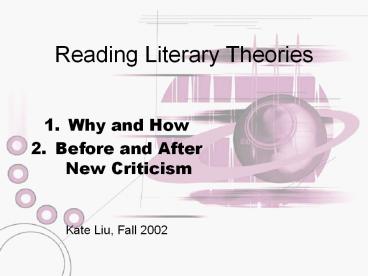Reading%20Literary%20Theories - PowerPoint PPT Presentation
Title:
Reading%20Literary%20Theories
Description:
no longer 'literary study,' ignoring the beauty or essence of literature; ... 1. The synchronic vs. the diachronic; langue vs. parole// competence vs. performance ... – PowerPoint PPT presentation
Number of Views:55
Avg rating:3.0/5.0
Title: Reading%20Literary%20Theories
1
Reading Literary Theories
- Why and How
- Before and After New Criticism
- Kate Liu, Fall 2002
2
Outline
- Why?
- How?
- Suggested attitudes
- The focus of our course
- Contextualizing our focus before and after New
Criticism
3
Why Theory?
- Con
- -- no longer literary study, ignoring the
beauty or essence of literature - -- a mere word play or mind game abstract and
obscure separate from reality or politics - -- fetishization of theories
- Pro
- -- It provides us new frameworks and
perspectives helps us ask new questions of the
texts we study and about our lives. - -- democratization of English Studies.
4
How?
- Read with an active mind. (Do not feel
oppressed by the difficult languages.) - Always read to get the main points (to find the
questions the theory asks) and to ask questions. - Always try to relate and to map. (Its
impossible to separate all the theoretical
discourses into mutually exclusive theoretical
schools.)
5
Theory as an Activity vs. Theory as a body of
knowledge
- In the former, theory is taught as a means of
understanding the world in the latter,
theorizing is encouraged as a pedagogical
practice in which students become actual
participants in the use of theory. (Henry
Girouxs ideas explained by Storey) - Its better to know how to theorize than to
memorize all the theoretical jargons.
6
General Questions to ask
- What are the theorists main concerns? What
questions does s/he ask and how does s/he answer
them? Do you have any questions? - What are the theorists key terms? How are they
defined? - What is the theorists method? Is a methodology
explicitly laid out or is it implied? - (modified from Doxography versus Inquiry by
Donald G. Marshall. Sadoff 84)
7
Articulation vs. Application
- Application one-to-one correspondence between a
theory and a text - Articulation (??) of theories and texts, of
different theories connecting, negotiating,
translating. - wrestling with the angels The only theory
worth having is that which you have to fight off,
not that which you speak with profound fluency.
(Stuart Hall textbook 1901)
8
The focus of our course
- Start with structuralism vs. poststructuralism to
trace a general movement in contemporary critical
theories. - Choose two theoretical schools to see how they
deal with the issues of language, subjectivity,
desire, body and socio-economic determination - Use examples from Cultural Studies to show these
theories are negotiated, combined and/or
re-interpreted.
9
before and after New Criticism
- Structuralism Basic ideas of Ferdinand de
Saussure? - 1. The synchronic vs. the diachronic langue vs.
parole// competence vs. performance - 2. Language is a system of difference. Meaning
occurs in binary opposition between two signs.
(e.g. toy, boy) - 3. sign signifier and signified the connection
between them is arbitrary.
10
Influences of Structuralism some examples
- Sign signifier signified? referent
- Language is not mimetic (a mirror, or a
transparent container of reality) it constructs
reality it speaks us. - Binary thinking.
11
Examples of binarism in traditional literary
theories
- Politics/Truth vs.
- Plato the realm of appearance vs. the realm of
Form ? poetry twice removed
- Poetics
- Aristotle Three unity, etc.
Sir Philip Sidney to teach and delight
The Mirror and the Lamp
12
Examples of binarism in traditional literary
theories (2)
- Reason
- Plato poetry tells lies and excites emotions.
- Pope -- golden rules restraint, good taste,
Dryden "wit" propriety of thoughts and words
- Emotion/Energy
- Romantic poets imagination
- New Criticism Setting up Literature as a
discipline (autonomy, organicism, etc.) - ? An objective approach, just as Structuralism
is scientific
13
Binaries in contemporary theories
- Politics vs. Poetics
- Art vs. popular culture
- Culture vs. Economic Relations
- Father vs. Mother Lack vs. imaginary plenitude
- fixity of meaning vs. fluidity of language,
identity and culture, etc. - The lines are no longer clear-cut. Autonomy and
Absolute truth are out.
14
References
- Storey, John, ed. . What is Cultural Studies A
Reader. London Arnold, 1996. - Sadoff, Dianne F and William E. Cain, eds.
Teaching Contemporary Theory to Undergraduates.
NY MLA 1994.































